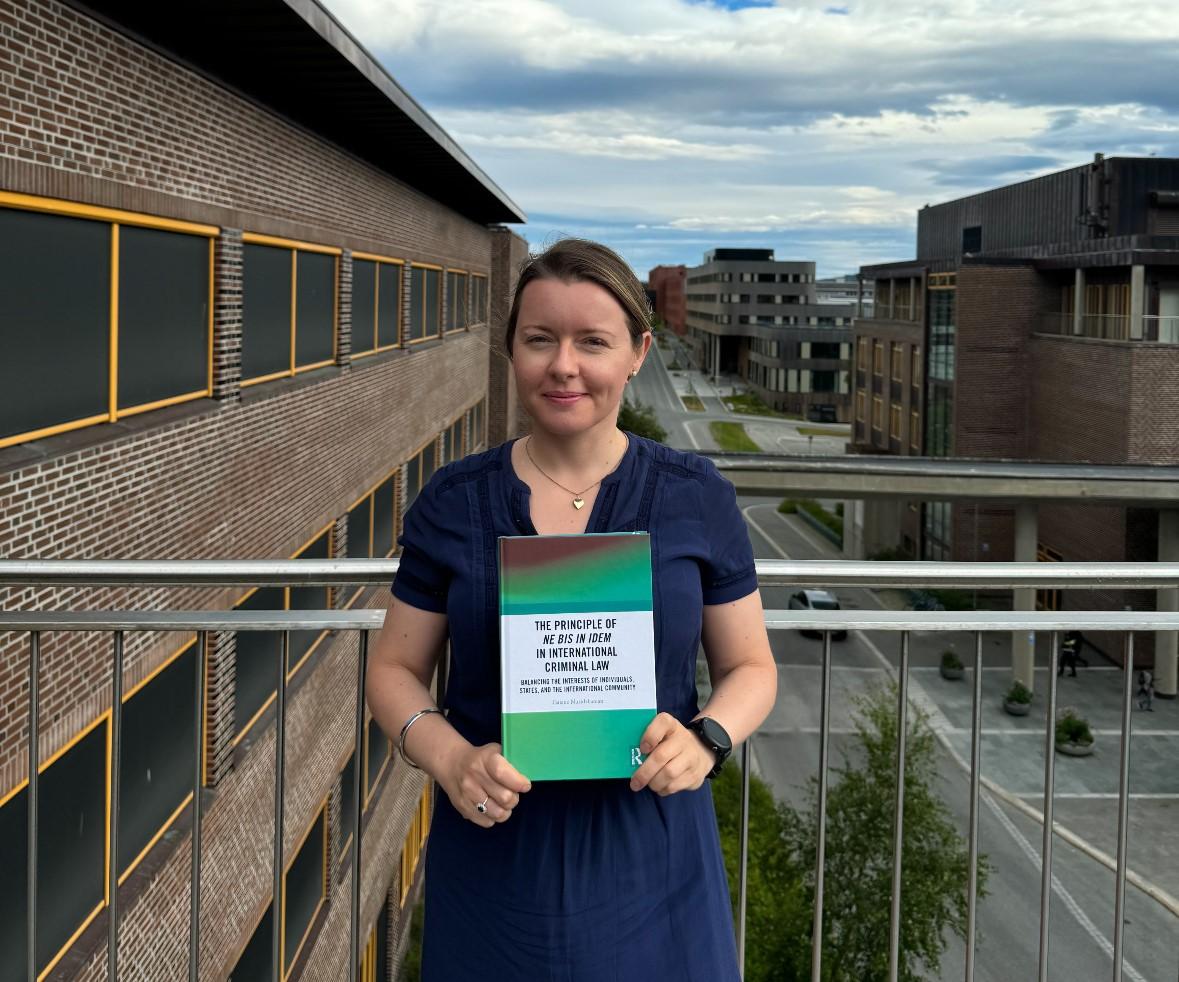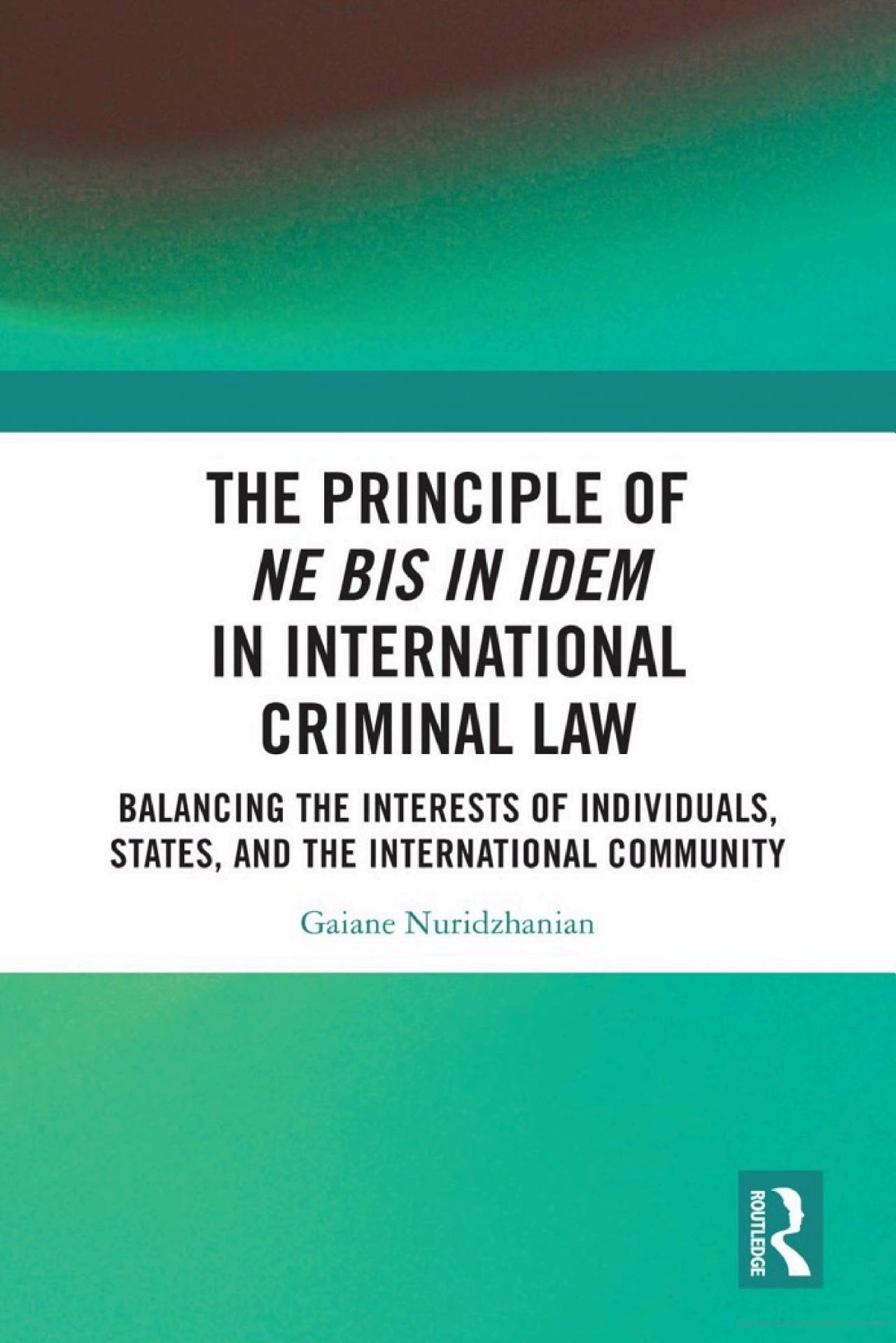One Crime, One Punishment: A Deep Dive Into ‘Ne Bis in Idem’ in International Criminal Law
Associate Professor Gaiane Nuridzhanian delves into the intricate legal principle of ne bis in idem in recently published book.


The principle of ne bis in idem, also known as double jeopardy, asserts that no person shall be tried twice for the same matter. This generally means that an individual who has already been tried and convicted of a crime cannot be tried again for the same crime.
The Principle of ne bis in idem in International Criminal Law by Gaiane Nuridzhanian is the first comprehensive monograph to explore how this principle functions in international criminal law.
As to why the topic piqued her interest, she explains that ne bis in idem is an important principle and a basic human right. It protects fundamental individual interests and safeguards the integrity of a criminal justice system.
- Respect for the finality of judicial decisions creates a presumption of consistency, correctness and legitimacy of judicial outcomes, thus contributing to maintaining the integrity of and public confidence in a criminal justice system.
While the principle is relatively well-researched in domestic criminal law, there is still much to explore regarding how this principle operates in international criminal law. An interesting aspect is that certain matters in international law, particularly in relation to issues of state sovereignty and accountability for atrocity crimes, can shape the content of ne bis in idem rules, either limiting or extending the scope of an individual’s right to be protected from repeated trials.
- The legal practice on the application of ne bis in idem in international criminal law is still developing, particularly within the jurisprudence of the International Criminal Court (ICC), Nuridzhanian explains.
The ICC, as a permanent international criminal court, has jurisdiction over serious crimes such as genocide, crimes against humanity, war crimes, and crime of aggression. One key issue the ICC faces is determining under what conditions an individual already tried in a domestic court is protected from being tried again for the same matter before the ICC. Another pertinent question is whether and to what extent someone tried by the ICC is safeguarded from subsequent trials for the same matter in domestic or other international criminal courts. These complex and critical issues are among the topics Nuridzhanian discusses in her book.
The publication serves as an essential resource for understanding how this crucial safeguard operates across different legal systems, offering a detailed analysis that is relevant for both legal professionals and scholars.
A new ne bis in idem issue in international criminal law has emerged.
With the potential creation of a special tribunal for the crime of aggression committed in Ukraine, the key question is whether individuals already tried by the ICC for war crimes committed in Ukraine can be prosecuted again before this special tribunal for crime of aggression.
In a recently published article, co-authored with Dr. Carrie McDougall, Nuridzhanian explains how ne bis in idem applies between the ICC and the proposed special tribunal.
Read the article: On Double Jeopardy, the ICC, and the Special Tribunal for the Crime of Aggression
Written by Vilde Sjøvold
Kortnytt fra Det juridiske fakultet
-
Fiskeri- og havbruksvitenskap - bachelor
Varighet: 3 År -
Fiskeri- og havbruksvitenskap - master
Varighet: 2 År -
Master of Philosophy in Visual and Multimodal Anthropology
Varighet: 2 År -
Arkeologi - master
Varighet: 2 År -
Peace and Conflict Transformation - master
Varighet: 2 År -
Indigenous Studies - master
Varighet: 2 År -
Technology and Safety - master
Varighet: 2 År -
Biologi - bachelor
Varighet: 3 År -
Rettsvitenskap - master
Varighet: 5 År -
Sosiologi - master
Varighet: 2 År -
Strategisk ledelse og økonomi - erfaringsbasert master
Varighet: 5 Semestre -
Engelsk - årsstudium
Varighet: 1 År -
Samfunnsplanlegging - bachelor
Varighet: 3 År -
Pedagogikk - bachelor
Varighet: 3 År -
Sosiologi - bachelor
Varighet: 3 År -
Arkeologi - bachelor
Varighet: 3 År -
Spansk - årsstudium
Varighet: 1 År -
Statsvitenskap - bachelor
Varighet: 3 År -
Pedagogikk - master
Varighet: 2 År -
Likestilling og kjønn - årsstudium
Varighet: 1 År -
Samfunnsplanlegging - master
Varighet: 2 År -
Økonomi og administrasjon - bachelor
Varighet: 3 År -
Samfunnssikkerhet - bachelor
Varighet: 3 År -
Økonomi og administrasjon, siviløkonom - master
Varighet: 2 År -
Ledelse, innovasjon og marked - bachelor
Varighet: 3 År -
Ergoterapi - bachelor
Varighet: 3 År -
Grunnskolelærerutdanning for 1.-7. trinn - master
Varighet: 5 År -
Grunnskolelærerutdanning for 5.-10. trinn - master
Varighet: 5 År -
Samfunnssikkerhet - master
Varighet: 2 År -
Kunst - bachelor
Varighet: 3 År -
Kunsthistorie - master
Varighet: 2 År -
Musikkutøving - bachelor
Varighet: 4 År -
Religionsvitenskap - årsstudium
Varighet: 1 År -
Russisk - årsstudium
Varighet: 1 År -
Samfunnsøkonomi med datavitenskap - bachelor
Varighet: 3 År -
Sosialantropologi - bachelor
Varighet: 3 År -
Organisasjonsdesign og ledelse - master
Varighet: 2 År -
Statsvitenskap - master
Varighet: 2 År -
Historie - master
Varighet: 2 År -
Kunsthistorie - bachelor
Varighet: 3 År -
Tysk - årsstudium
Varighet: 1 År -
Filosofi - bachelor
Varighet: 3 År -
Kvensk - årsstudium
Varighet: 1 År -
Barnehagelærer - bachelor
Varighet: 3 År -
Forfatterstudium 2 - årsstudium
Varighet: 1 År -
Barnevern - bachelor
Varighet: 3 År -
Sosialt arbeid - bachelor
Varighet: 3 År -
Bedriftsøkonomi - årsstudium
Varighet: 2 År -
Ledelse - årsstudium
Varighet: 2 År -
Sosialt arbeid - master
Varighet: 2 År






